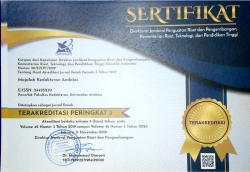Gene Polymorphisms Vitamin D Receptor Against Dengue Infection In Children
Abstract
BACKGROUND: Dengue infection is a vector-born disease associated with endemic areas in the tropics and subtropics. Genetic factors that play a role such as mutations and polymorphisms that influence a person's susceptibility to dengue fever.
AIM: This study aims to determine gene polymorphisms of vitamin D against dengue infection in children.
MATERIAL AND METHODS: This study was an observational study with a cross-sectional design, where the dependent and independent variables were examined at the same time in pediatric patients who were hospitalized with clinical symptoms of dengue infection at Raden Mattaher Hospital Jambi and Baiturrahim Jambi Hospital who met the inclusion criteria with positive anti-dengue IgM. and or positive anti-dengue IgG in children aged less than two years to eighteen years.
RESULT: The results showed that the relationship between patients who have polymorphisms in one of the vitamin D receptor genes will experience heavier dengue infection than those who do not have polymorphisms in the vitamin D receptor gene and this difference is statistically significan (p= 0.005).
CONCLUSION: This study concluded that there was a relationship between vitamin D receptor gene polymorphisms and the degree of dengue virus infection.
Keywords: Dengue infection in children, Vitamin D receptor gene polymorphisms, vitamin D level





















